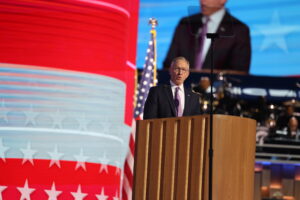- Slug: LDS Voters Immigration. 960 words.
- File photo available (thumbnail, caption below).
By Mia Osmonbekov
Cronkite News
WASHINGTON – Both former President Donald Trump and Vice President Kamala Harris have launched get-out-the-vote coalitions targeting the close to half a million Latter-day Saints in Arizona, a battleground state where every voting bloc will count in the presidential race.
Trump pitched himself to Arizona LDS voters while campaigning in Prescott Valley earlier this month. During an online “LDS for Trump” event, Trump told attendees that “we really have the same values.”
However, a growing number of LDS voters are feeling disillusioned about Trump, a shift initially evidenced by the 18% of Arizona’s LDS voters opting for Joe Biden in 2020, a New York Times exit poll showed. A national poll from the Survey Center of American Life also found that more than half of LDS voters surveyed expressed negative feelings toward Trump, while more than two-thirds of white evangelical Protestants viewed him positively.
“I think immigration is actually a huge factor there. Immigration issues hit a little differently for Latter-day Saint voters,” said Rob Taber, the national director for Latter-day Saints for Harris-Walz.
Taber remembers seeing staunchly Republican families bringing their children in strollers to protest Trump’s 2017 travel ban – which restricted people from predominantly Muslim countries from coming to the United States – “because they felt that strongly about it.”
LDS voters differ from other religious groups in their progressive stance on immigration. It’s an outlook informed by growing up in the church where young people are sent as missionaries abroad, an experience that increases tolerance for undocumented immigrants, according to a 2020 academic study.
“The saying goes that travel cures bigotry,” said Stacy Pearson, a Democratic political consultant. “So you’ve got a really well-educated, really well-traveled population of people who are family-oriented and can’t stomach the thought of deporting a father and having American-born children and a spouse left behind.”
This belief conflicts with Trump’s hardline border enforcement rhetoric, which includes calling for the largest mass deportation in American history. Harris, while toughening her own border stance, doesn’t openly vilify migrants, a choice that could appeal to sympathetic LDS voters, according to an Arizona State University border scholar.
“Kamala (Harris’) and Trump’s views on immigration, as an immigration scholar, are really not that different as they’re treating the border,” said Brittany Romanello, a migration postdoctoral fellow who researches LDS identity. “The rhetoric on Harris’ side is much more humanizing and inclusive.”
Taber said that Trump’s talking points about immigrants are “the sand in the gears that gets people to start rethinking” voting Republican and is a “big motivator” for LDS members to join the pro-Harris LDS coalition.
“This is one of the conversations I’ve had over and over again. These were folks who either have done their mission stuff overseas, somewhere in Latin America, or somewhere in Africa, Asia, or among immigrant families, who really find Trump’s rhetoric about immigration to be absolutely vile and off-putting,” Taber said.
Romanello, who grew up in the church, said Trump’s anti-immigrant rhetoric is “not reconcilable” with some LDS people’s beliefs about immigrants, but they negotiate what values are most important when they cast a ballot.
Tyler Montague, a Republican political consultant who heads the Arizona Public Integrity Alliance, said abortion “is the biggest issue that would keep somebody in Trump’s camp.”
“Harris and Democrats in general turn off LDS voters with strong advocacy for abortion. So they kind of swallow hard and vote Trump, even though they are turned off by him,” Montague said.
But he also said a “sizeable amount” of LDS voters could defect from voting Republican this election cycle, enough to give Harris a boost in a swing state like Arizona, which Biden won by just 10,000 votes.
“She could absolutely make a difference by appealing to the LDS population,” Montague said.
For some LDS voters in Arizona like D’Angelo Perez, a 23-year-old from Mesa, Trump was never an option.
“I’m a person of color. My dad is an immigrant, so those things just really turned me off from him way back in 2016,” he said. “It’s a pretty clear choice for me in this race that I’m going to vote for Harris.”
Arizona’s LDS community has pushed back against politicians who design and enforce anti-immigrant legislation in the past.
In 2010, they helped recall state Sen. Russell Pearce, sponsor of the controversial “show me your papers” Senate Bill 1070. The Church of Latter-day Saints rejected enforcement-only measures like SB 1070 in favor of a balanced approach.
LDS voters also helped oust Sheriff Joe Arpaio, famous for illegally targeting the Latino community when enforcing SB 1070, according to Democratic consultant Pearson, whose firm helped Paul Penzone defeat Arpaio in 2016. She said LDS voters have been key to Arizona races since then, including delivering the Arizona gubernatorial race to Katie Hobbs in 2022.
“That community has been reliably moral, and they have rejected the extremists,” Pearson said.
LDS support for Republican presidential tickets has also dropped significantly, from 80% in 2004 for George W. Bush to 61% for Trump in 2016, even as other religious groups moved to the right, according to Pew Research Center.
High-profile LDS political figures including former Republican presidential candidate Mitt Romney and former Arizona House Speaker Rusty Bowers have condemned Trump. Former Sen. Jeff Flake of Arizona and Mesa Mayor John Giles endorsed Harris outright, with Giles even speaking at the Democratic National Convention in August. But there’s still a social pressure to present as conservative within the mostly-Republican LDS community, according to Romanello.
“The church is not telling people to vote Republican, but in the social circles on the local congregation level, that is still very much a cultural more,” Romanello said. “There’s a lot more to lose if you lose the network that you’ve made, which is primarily other Mormons.”
For more stories from Cronkite News, visit cronkitenews.azpbs.org.
